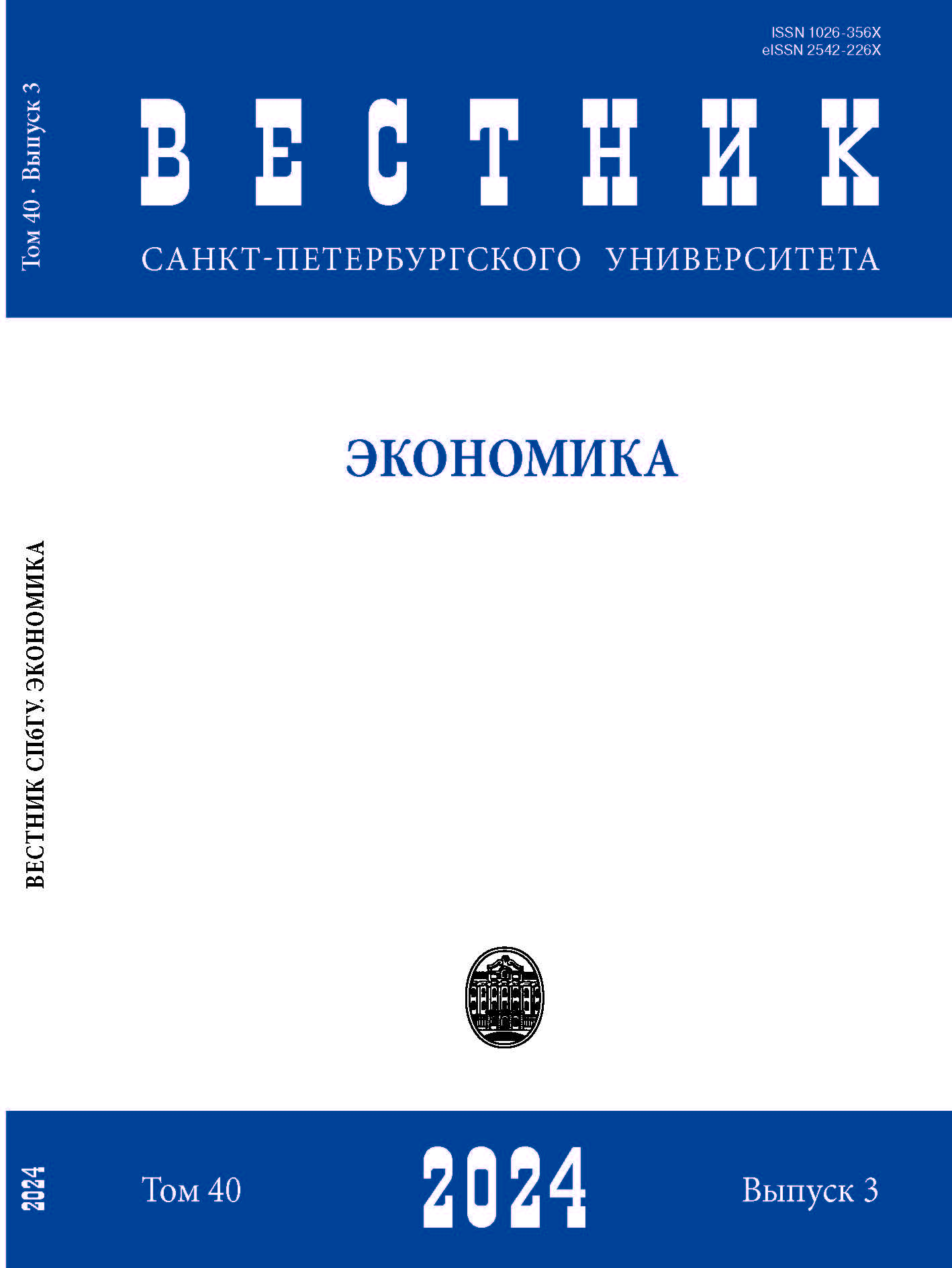Management in the field of decentralized finance based on blockchain technologies
DOI:
https://doi.org/10.21638/spbu05.2024.304Abstract
Currently, the benefits of decentralization through blockchain technology in the financial sector are actively discussed, but rarely quantified. This article attempts to examine the potential benefits and limitations of blockchain technology in improving governance and performance
in digital financial ecosystems. The possibilities of using blockchain technology from traditional financial structures to the creation of new business models operating on blockchain networks and using smart contracts are shown. The impact of decentralization in the management
of decentralized autonomous organizations (DAOs) on the financial performance of companies in the field of decentralized finance (DeFi) was assessed. In the process of research, we use the Gini coefficient as an indicator of inequality among token holders. This metric is analyzed in the context of return on investment (ROI) for DeFi companies. The method of linear regression analysis and the rule of interpretation of natural logarithms in regression were used for calculations. This analysis revealed a significant relationship and positive impact of
decentralization on the functioning and profitability of organizations in the DeFi field. The resulting relationship indicates that with increasing decentralization in management, the return on invested capital increases. To improve investment attractiveness and long-term stability,
DeFi companies should consider fairer ways to allocate tokens so that decentralized governance models based on blockchain and DAO become more profitable. The results and conclusions obtained from the study are based on academic research articles, open data, industry
reports and company reports in the DeFi industry.
Keywords:
blockchain, management, decentralized finance, decentralized autonomous organizations.
Downloads
References
Al Ajlouni, A. T. and Al-Hakim, M. S. (2018) ‘Financial Technology in Banking Industry: Challenges and Opportunities’, ICEAS, April 12. https://doi.org/10.2139/ssm.3340363
Aleshina, A. (2022) ‘The impact of financial technologies and decentralized finance (DeFi) on threats to the infrastructure of the national economy’, Financial markets and banks, 1, рр. 121–125. (In Russian)
Andreas, S. and Espen, B. (2023) Best Practices in Decentralized Autonomous Organization (DAO) Venture Capital. Available at: https://uia.brage.unit.no/uiaxmlui/bitstream/handle/11250/3081668/no.uia%3Ainspera%3A143804064%3A35492471.pdf?sequence=1 (accessed: 20.08.2023).
Bellevitis, C., Fisch, C. and Momtaz, P. P. (2022) The rise of decentralized autonomous organizations (DAOs):A first empirical glimpse. Available at: https://www.researchgate.net/publication/359712137_The_rise_ of_decentralized_autonomous_organizations_DAOs_a_first_empirical_glimpse (accessed: 20.08.2023).
CoinGecko: Analytical Web Resource. Available at: https://www.coingecko.com/ (accessed: 10.09.2023).
CoinGecko. (2022) Annual Crypto Industry Report. Available at: https://assets.coingecko.com/reports/2022/
CoinGecko-2022-Annual-Crypto-Industry-Report.pdf (accessed: 30.08.2023).
Davidson, S., De Filippi, P. and Potts, J. (2017) ‘Blockchains and the Economic Institutions of Capitalism’,Journal of Institutional Economics, 14 (4), pp.1–20. https://doi.org/0.1017/S1744137417000200
Etherscan: Analytical Web Resource. Available at: https://etherscan.io/ (accessed: 10.09.2023).
Fang, L., Hoar, B., Azmi, E. and Win, K. (2021) How to DeFi: Advanced. Available at: https://marsown.com/wordpress/wp-content/uploads/2021/09/How-to-DeFi-Advanced.PDF.pdf (accessed: 25.08.2023).
Gini Coefficient formula. (2012) Available at: https://www.ellipsix.net/blog/2012/11/the-gini-coefficient-fordistribution-inequality.html (accessed: 05.09.2023).
IMF. (2016) Monetary and financial statistics manual and compilation guide. Available at: https://www.imf.org › mfsmcg_merged-web pdf (accessed: 30.08.2023).
Kusmierz, B. and Overko, R. (2022) How centralized is decentralized? Comparison of wealth distribution in coins and tokens. Available at: https://arxiv.org/pdf/2207.01340.pdf (accessed: 30.08.2023).
Lage, O., Saiz-Santos, M. and Zarzuelo, J. M. (2022) ‘Decentralized platform economy: Emerging blockchain-based decentralized platform business models’, Electronic Markets, 32, pp. 1707–1723.
Lumineau, F., Wang, W. and Schilke, O. (2021) ‘Blockchain Governance — A New Way of Organizing Collaborations?’, Organization Science, 32 (2), pp. 500–521. https://doi.org/10.1287/orsc.2020.1379
Messari: Analytical Web Resource. Available at: https://messari.io/ (accessed: 10.09.2023).
Nakamoto, S. (2008) Bitcoin: Peer-to-Peer Electronic Cash System. Available at: https://nakamotoinstitute.org/bitcoin/ (accessed: 23.09.2023).
Putilov, A., Manakhova, I. and Khurina, K. (2022) ‘Developing of Smart Technical Platforms National Economic Security’, Studies in Computational Intelligence, 1032 SCI, pp. 208–215. https://doi.org/10.1007/978-3-030-96993-6_20
Statista. (2023) Financial Services. Available at: https://www.statista.com/markets/414/topic/459/financialservices/overview (accessed: 20.09.2023).
Weking, J., Mandalenakis, M., Hein, A., Hermes, S., Böhm, M. and Krcmar, H. (2019) The impact of blockchain technology on business models — a taxonomy and archetypal patterns. Available at: https://www.researchgate.net/publication/338118210_The_impact_of_blockchain_technology_on_business_models_ _a_taxonomy_and_archetypal_patterns (accessed: 23.09.2023).
Yaga, D., Mell, P., Roby, N. and Scarfore, K. (2018) NSIT 8202. Blockchain Technology Overview. https://doi.org/10.6028/NIST.IR.8202
Downloads
Published
How to Cite
Issue
Section
License
Articles of the St Petersburg University Journal of Economic Studies are open access distributed under the terms of the License Agreement with Saint Petersburg State University, which permits to the authors unrestricted distribution and self-archiving free of charge.







